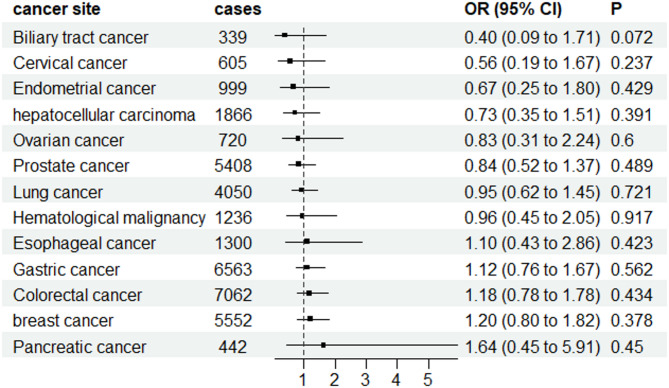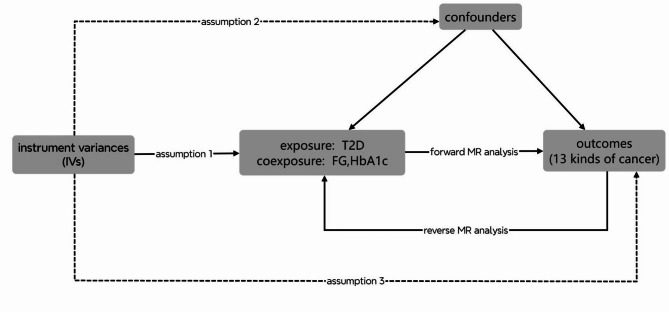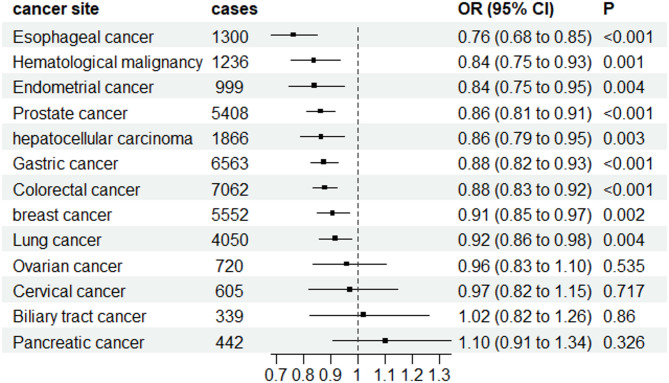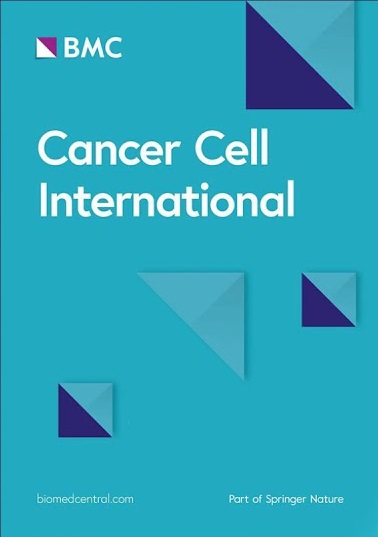东亚2型糖尿病和癌症风险的孟德尔随机研究。
摘要
我们的研究旨在探索T2D易感性与几种癌症风险之间的遗传相关性,这些癌症主要集中在欧洲血统的人群中。在东亚人群中,我们利用两样本孟德尔随机化来研究2型糖尿病(T2D)与癌症易感性之间的复杂关系。本研究利用了来自三个可靠来源的遗传数据:日本理化学研究所遗传关联百科全书(JENGER)、亚洲遗传流行病学网络(AGEN)和葡萄糖和胰岛素相关性状的Meta分析(MAGIC)。我们探讨了暴露数据集(包括T2D、糖化血红蛋白(HbA1c)和空腹血糖(FG)水平)与结果数据集中几种常见癌症风险之间的关系。通过分析174个与T2D相关的snp, 15个与FG相关的snp, 74个与HbA1c相关的snp,我们发现T2D与大多数癌症呈显著的负相关,包括胃癌(OR = 0.875, 95%CI: 0.825-0.928),乳腺癌(OR = 0.907, 95%CI:0.850 ~ 0.967)、食管癌(OR = 0.761, 95%CI:0.681 ~ 0.851)、结直肠癌(OR = 0.877, 95%CI:0.834 ~ 0.923)、血液恶性肿瘤(OR = 0.837, 95%CI:0.752 ~ 0.933)、肺癌(OR = 0.916, 95%CI:0.858 ~ 0.977)、肝细胞癌(OR = 0.865, 95%CI: 0.887 ~ 0.951)、前列腺癌(OR = 0.862, 95%CI:0.812 ~ 0.914)、子宫内膜癌(OR = 0.841)。胃癌、乳腺癌、食管癌、结直肠癌、前列腺癌的发病率达到预期的80%。相反,在东亚人群中,我们没有观察到T2D与特定癌症之间的负相关。基因预测的FG和HbA1c水平与特定癌症相关的证据有限。此外,进行多变量MR分析并没有改变T2D与特定肿瘤之间的相关性。这些发现解释了东亚祖先中患t2dm的遗传易感性与各种类型癌症之间的因果关系,而且这种关系不受血糖生物标志物的影响。



Our research aims to explore genetic correlation between T2D predisposition and risks of several cancers, which have been predominantly focused on populations of European ancestry. In an East Asian population, we leverage two-sample Mendelian Randomization to investigate the complex association between Type 2 Diabetes (T2D) and cancer susceptibility. This investigation utilizes genetic data summarized from three reputable sources: the Japanese ENcyclopedia of GEnetic associations by Riken (JENGER), the Asian Genetic Epidemiology Network (AGEN), and the Meta Analyses of Glucose and Insulin-related traits (MAGIC). We explored the associations between exposure datasets, which included T2D, glycated hemoglobin (HbA1c) and fasting glucose (FG) levels, and the risk of several prevalent cancers for the outcome datasets. By analyzing 174 SNPs associated with T2D, 15 SNPs related to FG, and 74 SNPs linked to HbA1c, we discovered a significant inverse relationship between T2D and the majority of cancers, including gastric (OR = 0.875, 95%CI: 0.825-0.928), breast (OR = 0.907, 95%CI: 0.850-0.967), esophageal (OR = 0.761, 95%CI:0.681-0.851), colorectal (OR = 0.877, 95%CI:0.834-0.923), hematological malignancy (OR = 0.837, 95%CI:0.752-0.933), lung (OR = 0.916, 95%CI:0.858-0.977), hepatocellular (OR = 0.865, 95%CI:0.787-0.951), prostate (OR = 0.862, 95%CI:0.812-0.914), and endometrial cancer (OR = 0.841). The power of gastric cancer, breast cancer, esophageal cancer, colorectal cancer and prostate cancer reached the desired 80%. Conversely, we did not observe a reverse correlation between T2D and specific cancers in the East Asian population. There is limited evidence that genetically predicted FG and HbA1c levels are associated with specific cancer. Moreover, conducting multivariable MR analysis did not alter the correlation between T2D and specific tumors. These findings explain the causal associations of genetic liability to T2D with various types of cancers in East Asian ancestry, and this association is not affected by glycemic biomarkers.

 求助内容:
求助内容: 应助结果提醒方式:
应助结果提醒方式:


